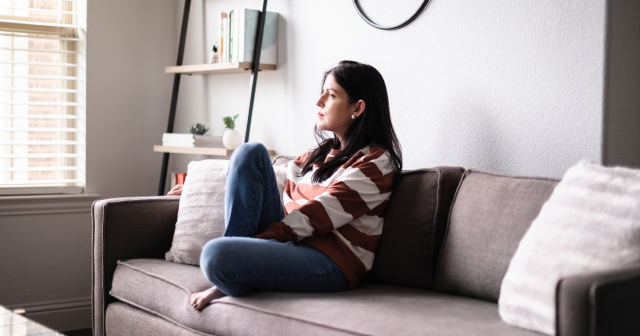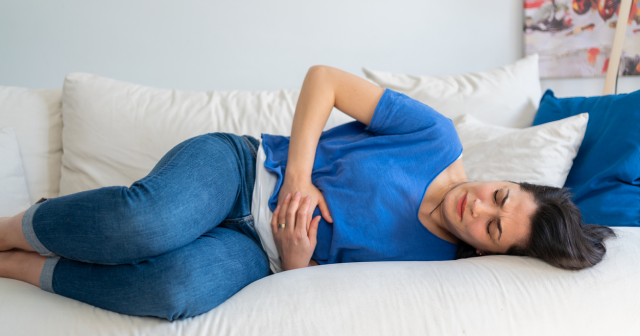While the menopause is a natural part of ageing, it can have a big impact on your life. Along with common menopause symptoms such as mood swings and hot flushes, many people find that they put on weight – especially around the tummy area.
In addition to how this might make you feel, carrying too much weight can increase your risk of several health conditions.
But the good news is that understanding how the menopause can lead to weight gain, and what changes you can make, can help you avoid putting on weight during the menopause. So read on to learn more.
What causes menopause weight gain?
The menopause is when you stop having periods and can no longer get pregnant. The age at which this happens varies a lot, but most people start to go through the menopause in their 40s or 50s.
This is often a time of general changes in your body and lifestyle, as well as changes that are specifically related to the menopause, and both can play a part in weight gain.
As you reach middle age, for example, you may be less active than you were when you were younger. The combination of lifestyle changes, age-related health niggles (such as aches and pains) and your metabolism slowing down can mean that you use less energy (calories) every day.
Plus, the menopause causes a drop in the amount of a hormone called oestrogen in your body, and this is also thought to contribute to weight gain. The weight gain is often particularly noticeable round your tummy – meaning even a small increase can lead to a change in clothing size.
Is menopause weight gain bad for my health?
Because the weight you put on during the menopause tends to be around your middle, fat can be stored around your vital organs. This can be worse for your health than other types of weight gain, and it’s linked to several health conditions.
Oestrogen protects against heart disease, but when oestrogen levels drop during and after the menopause, men and women have the same heart disease risk. Gaining weight can also increase your risk of high blood pressure and diabetes. These things can combine to increase your risk of heart disease during and after the menopause.
Weight gain during and after the menopause can also increase your risk of certain cancers such as breast and colorectal cancers.
What’s more, other physical symptoms of the menopause, such as hot flushes and night sweats, can be worse if you’re overweight.
And as weight gain can knock your self-esteem, it may also play a part in the low mood that sometimes comes with the menopause.
How do I lose weight during menopause?
Thankfully, however, menopause weight gain isn’t inevitable, and there are things you can do to help you avoid or lose it.
Exercise
In order to lose weight, you need to have a calorie ‘deficit’, where you use more calories than you eat. To do this, you can reduce the number of calories you eat every day. However, research shows that regular physical activity is the only way to maintain weight loss – so it’s vital that you get active, too.
The amount of exercise you need to do to keep to a healthy weight varies from person to person, but it’s recommended that everyone does at least 150 minutes of moderate-intensity aerobic exercise, or 75 minutes of vigorous aerobic exercise, a week (or a mixture).
For example, you could take a brisk 30-minute walk on 5 days of the week, or go for a 25-minute run on 3 days of the week.
If you’re trying to lose weight and keep it off, however, you’ll probably need to do more exercise than this. To avoid putting weight back on after you’ve lost it, for example, you may need to do 60-90 minutes of activity every day.
Diet
As mentioned above, if you’re trying to lose weight, you’ll probably need to reduce your calorie intake. This can involve eating smaller portions and reducing the amount of fatty, sugary and processed foods you eat, as well as cutting back on alcohol.
Plus, whether you want to lose weight or just avoid menopause weight gain, it’s important to eat a healthy and balanced diet.
It’s also a good idea to make sure you’re getting plenty of calcium and vitamin D from your diet to support bone strength, which is important because of the increased risk of osteoporosis during the menopause. Maintaining strong bones will also help you to keep active, which in turn will help you keep your weight down.

Lifestyle changes
Other simple lifestyle changes can help you avoid or reduce menopause weight gain, including:
- making sure you get enough sleep (7 to 9 hours a night). This will help ensure you have the energy and motivation to keep active and stick to a healthy diet during the day
- reducing stress. The stress hormone, cortisol, is associated with putting on fat around your tummy, so try to relax with activities such as exercise, yoga or meditation
For more ideas, read tips on how to lose weight safely.
If you’re struggling with the menopause and weight gain it’s a good idea to speak to your doctor. They may be able to suggest other strategies and treatments to help.
Key points
- it’s common to gain weight during and after menopause, particularly around your tummy
- weight gain can increase your risk of various other health conditions
- a drop in oestrogen levels, a slowing of your metabolism and a less active lifestyle can combine to contribute to menopause weight gain
- regular exercise and a healthy diet can help you manage your weight during menopause, along with good sleep habits and stress reduction






